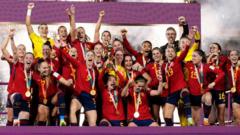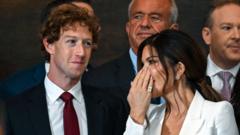The appointment of Thomas Tuchel as England’s national football manager has ignited a complex debate surrounding national identity, coaching ethics, and the unexpected alliances formed against it.
The Ethical Dilemma of Coaching Choices: Tuchel's Appointment Under Scrutiny

The Ethical Dilemma of Coaching Choices: Tuchel's Appointment Under Scrutiny
As England welcomes a foreign coach like Thomas Tuchel, concerns about identity and nationality rise in a politically charged environment.
With Nigel Farage, Sam Allardyce, and The Daily Mail unified in their critique, questions linger about what it means to support a foreign coach amidst concerns that such decisions undermine English talent and identity.
In the realm of sport, few issues spark as much passionate debate as national representation in coaching roles. The recent decision to appoint Thomas Tuchel, a German, as England's national football manager has not only raised eyebrows but also ignited discussions steeped in broader societal and political implications.
The backlash against Tuchel's hiring was perhaps to be expected, especially when voices such as Nigel Farage, Sam Allardyce, and members of The Daily Mail editorial team emerged as prominent critics. Their shared sentiment against a foreign coach at the helm of the English team may serve as a wake-up call to examine the deeper undercurrents of national identity that influence public opinion.
While Allardyce made an argument centered on the need for British coaches, Farage's perspective seems to stem more from a desire for nationalistic authenticity, expressing that the England manager should be English. In contrast, The Daily Mail's focus on Tuchel's nationality appears more emotionally charged and less substantiated by logic or rational argument.
This confluence of dissent highlights a significant aspect of modern public discourse; many now believe that opinions on various issues are intricately linked. Thus, to express support for Tuchel could be misconstrued as an endorsement of Farage's ideologies, particularly surrounding immigration and national belonging.
Navigating through this moral maze presents a clear dilemma for fans and stakeholders alike: how do we embrace inclusivity in sports while acknowledging and honoring our national identity? As Tuchel prepares to take charge, England finds itself at a crossroads of tradition and globalism, raising crucial questions about what it truly means to represent one's country on a global stage.
In the realm of sport, few issues spark as much passionate debate as national representation in coaching roles. The recent decision to appoint Thomas Tuchel, a German, as England's national football manager has not only raised eyebrows but also ignited discussions steeped in broader societal and political implications.
The backlash against Tuchel's hiring was perhaps to be expected, especially when voices such as Nigel Farage, Sam Allardyce, and members of The Daily Mail editorial team emerged as prominent critics. Their shared sentiment against a foreign coach at the helm of the English team may serve as a wake-up call to examine the deeper undercurrents of national identity that influence public opinion.
While Allardyce made an argument centered on the need for British coaches, Farage's perspective seems to stem more from a desire for nationalistic authenticity, expressing that the England manager should be English. In contrast, The Daily Mail's focus on Tuchel's nationality appears more emotionally charged and less substantiated by logic or rational argument.
This confluence of dissent highlights a significant aspect of modern public discourse; many now believe that opinions on various issues are intricately linked. Thus, to express support for Tuchel could be misconstrued as an endorsement of Farage's ideologies, particularly surrounding immigration and national belonging.
Navigating through this moral maze presents a clear dilemma for fans and stakeholders alike: how do we embrace inclusivity in sports while acknowledging and honoring our national identity? As Tuchel prepares to take charge, England finds itself at a crossroads of tradition and globalism, raising crucial questions about what it truly means to represent one's country on a global stage.





















